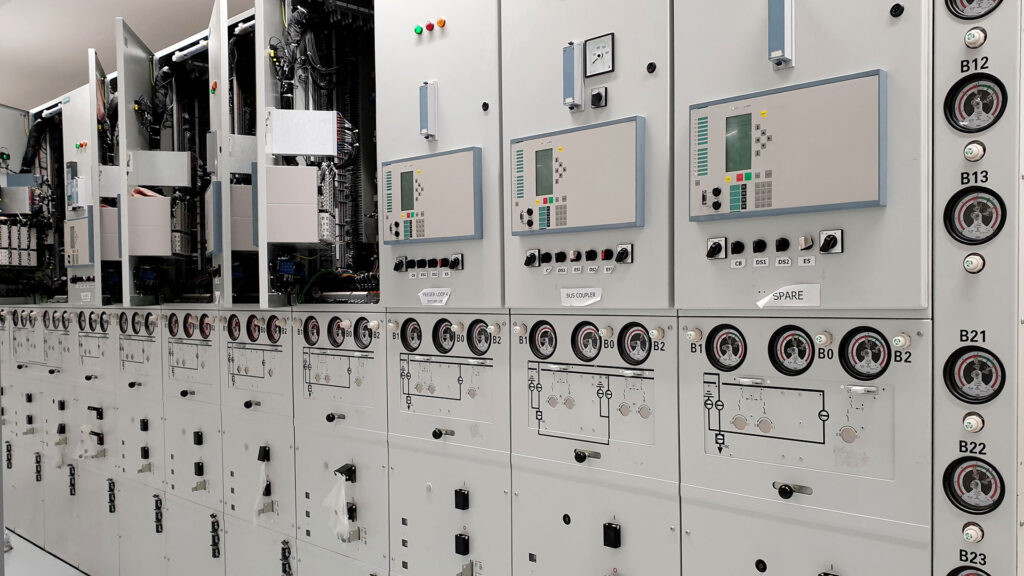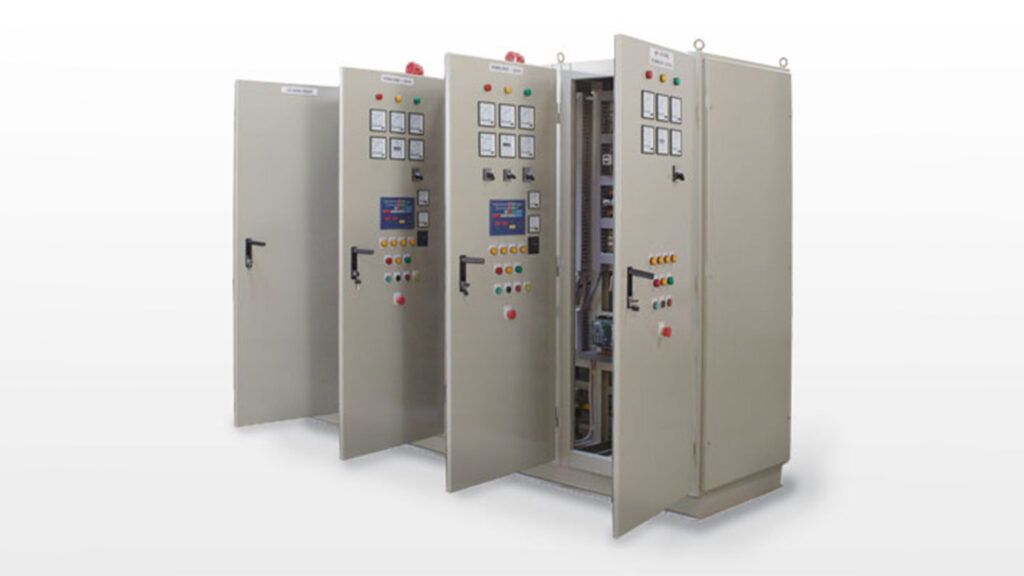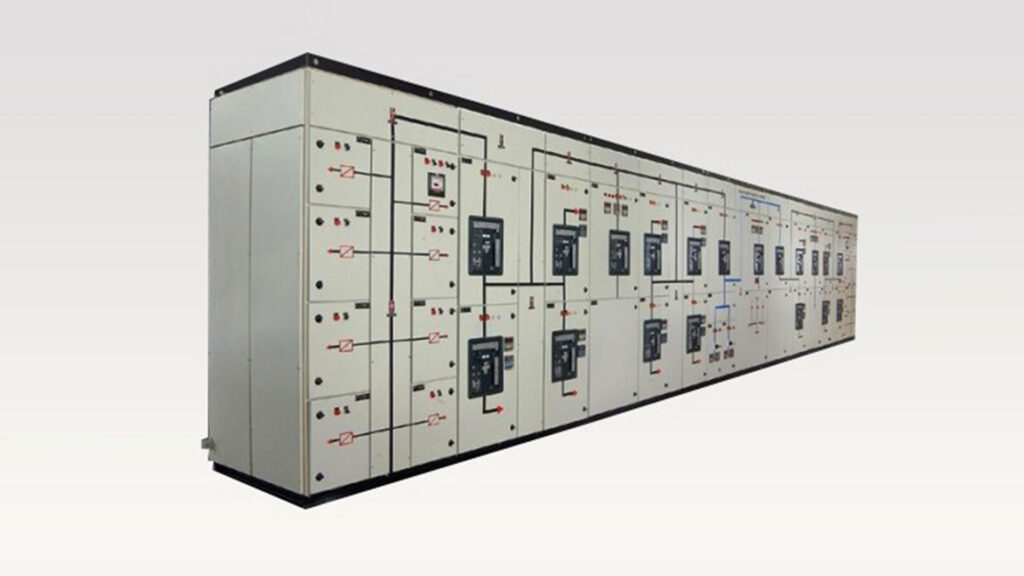Introduction
In today’s industrial world, electrical panels are playing a crucial role in power distribution and control. By understanding the different types of electrical panels available in the market, we can ensure efficient and safe electrical systems. In this blog, we will explore and compare four common types of electrical panels.
What are the 4 types of electric panels?
Electric panels are devices that distribute and regulate the flow of electricity in a system. There are four main types of electric panels, each with its own purpose and function.
1. Automatic Power Factor Control (APFC) Panels
2. Motor Control Centre (MCC) Panels
3. Automatic Mains Failure (AMF) Panels
4. Power Control Centre (PCC) Panels
Let’s dive into each type and explore their unique features and applications.
Automatic Power Factor Control Panels (APFC)
They are used to improve the power factor of a system by automatically switching capacitors on and off. This reduces the reactive power consumption and increases the efficiency of the system.

Applications
The users of Automatic Power Factor Control Panels are:
- Industries that use motors, transformers, or fluorescent lighting, such as automobile, metal, pharmaceutical, cement, chemical, etc.
- Power stations and windmills that generate and distribute electricity
- Hospitals, malls, banks, and IT parks that require stable and efficient power supply
Advantages
The potential advantages of APFC panels are:
- Improved power quality by reducing voltage drops, fluctuations, and harmonics
- Energy efficiency by reducing reactive power and apparent power demand
- Increased system capacity by freeing up more power for useful work
- Reduced electricity bills and penalties by avoiding power factor surcharges and maximum demand charges
- Automatic control and monitoring of power factor by switching capacitors and reactors as needed
Motor Control Centre Panels (MCC)
They are used to control the operation of multiple motors in a system. They provide protection, monitoring, and control features for each motor, such as overload, short circuit, start/stop, speed, etc.

Applications
The users of MCC panels are:
- Industries that use multiple motors for various processes, such as food, chemical, pharmaceutical, petroleum, etc.
- Power plants that generate and distribute electricity.
- Facilities that require efficient power management, safety, and protection for the motors in the system
Advantages
The potential advantages of MCC panels are:
- Simplified installation and maintenance of the motors and their control devices.
- Reduced floor space and wiring costs by housing all the required components in a single location.
- Enhanced safety and protection features for the motors, such as overload, short circuit, start/stop, speed, etc.
- Improved operation and performance of the motors by using PLC and SCADA for remote control and monitoring.
Automatic Mains Failure (AMF) Panels
They are used to detect the failure of the main power supply and automatically switch to a backup generator. They also monitor the status of the generator and switch back to the main supply when it is restored.

Applications
The users of AMF panels are:
- Industries and facilities that require uninterrupted power supply, such as hospitals, malls, banks, IT parks, etc.
- Power plants and windmills that generate and distribute electricity.
- Systems that need automatic changeover between mains electric supply and backup generator.
Advantages
The potential advantages are:
- Reduced labor cost and human error by eliminating the need for manual intervention.
- Increased safety and reliability by detecting and switching the power sources in case of failure.
- Enhanced protection and monitoring features for the power system, such as fuses, circuit breakers, relays, etc.
- Optimized power consumption and efficiency by using PLC and SCADA for remote control and management
Power Control Centre (PCC) Panels
They are used to distribute the power from the main source to various sub-circuits in a system. They provide protection, isolation, and control features for each sub-circuit, such as circuit breakers, fuses, relays, etc.

Applications
Some possible applications and advantages of PCC panels are:
- Industries that require centralized control and monitoring of power distribution to various electrical equipment, such as motors, generators, transformers, etc.
- Power plants that generate and distribute electricity.
- Facilities that need efficient power management, safety, and protection for the sub-circuits in the system.
Advantages
- Reduced installation and maintenance costs by housing all the required components in a single location.
- Improved safety and reliability by providing circuit protection, isolation, and control features for each sub-circuit.
- Enhanced performance and efficiency by using metering and monitoring instruments, control relays, and remote control devices.
Balaji Switchgears: Who are we?
At Balaji Switchgears, we take pride in being a top low voltage switchgears distributor. With 34 years of experience in the industry, we understand the importance of reliable and efficient electrical systems. Our commitment to quality and customer satisfaction sets us apart. We are amongst the best lapp wires and cables suppliers in Delhi, ensuring top-notch electrical connections for various applications. Our team of experts is dedicated to providing personalized solutions and exceptional service to our valued customers.
Trust us for all your electrical panels, switchgears, automations, and wiring needs. We are here to power your success.
Conclusion
In this blog, we have explored the four types of electrical panels: automatic power factor control panels, motor control centre panels, automatic mains failure panels, and power control centre panels. Each type serves a specific purpose and caters to different electrical system requirements. Whether it’s regulating power factor, controlling motors, ensuring uninterrupted power supply, or managing complex power distribution, there is an electrical panel designed for every application.
As a low voltage switchgears distributor, we understand the importance of reliable electrical panels and the role they play in efficient power distribution. And being the best lapp wires and cables supplier, we ensure high-quality electrical connections in various installations. For all your electrical panel and wiring needs, trust us to provide top-notch products and expertise.
Remember, when selecting an electrical panel, consider your specific requirements, consult professionals, and prioritize safety and efficiency. With the right electrical panel in place, you can ensure a well-managed and reliable electrical system for your industrial and commercial operations.

Pingback: What are the 4 Types of Electrical Panels: A Co...
Pingback: What are the 4 Types of Electrical Panels: A Comparison and Contrast – BSPL
Your writing is so relatable and down-to-earth It’s like having a conversation with a good friend Thank you for always being real with your readers
Your blog post was like a crash course in [topic]. I feel like I learned more in five minutes than I have in months of studying.
Your blog post was so thought-provoking. It’s rare to find content that challenges me to think deeply about important issues.
Your blog post was so relatable – it’s like you were reading my mind! Thank you for putting my thoughts into words.
Your writing always leaves me feeling inspired and motivated. Thank you for sharing your wisdom with the world.